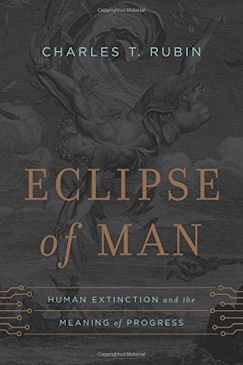
|
Posted November 9, 2014
Book: Eclipse of Man: Human Extinction and the Meaning of Progress Author: Charles T. Rubin Encounter Books. New York. 2014. Pp. 223 An Excerpt from the Jacket:
Tomorrow has never looked better. Breakthroughs in fields like genetic engineering and nanotechnology promise to give us unprecedented power to redesign our bodies and our world. Futurists and activists tell us that we are drawing ever closer to a day when we will be as smart as computers, will be able to link our minds telepathically, and will live for centuries --- or maybe forever. The perfection of a "posthuman" future awaits us. Or so the story goes. In reality, the rush toward a posthuman destiny amounts to an ideology of human extinction, an ideology that sees little of value in humanity except the raw material for producing whatever might come next. In Eclipse of Man, Charles T. Rubin examines intellectual precursors of the movement to perfect and replace the human race. He shows how today's advocates of radical enhancement are --- like their forebears --- deeply dissatisfied with given human nature and fixated on grand visions of a future shaped by what they would call technological progress. Moreover, Rubin argues that this myopic vision of progressivism stands in stark contrast to the more nuanced pictures of the human future that can be found among thoughtful writers of fiction. By exploring and criticizing the dreams of posthumanity, Rubin defends a more modest vision of the future, one that takes seriously both the limitations and the inherent dignity of our given nature. An Excerpt from the Book: "Mankind will surely destroy itself." Whether predicted in a thunderous denunciation of our flaws or with mild worldly regret, an apocalyptic future has become a cliché. Will it be global warming or global cooling? Nuclear winter or radiation poisoning? Famine due to overpopulation, or pollution -induced sterility? These are some of the possibilities I grew up with. But today, it is becoming increasingly common to hear of another route to the demise of humanity: we will improve ourselves, becoming something new and better, and in doing so we will destroy what we are now. We have this opportunity because science and technology are giving us the power to control human evolution, turning it from a natural process based on chance to one guided by our own intelligence and will. This idea --- that human progress points toward human extinction --- is held by people who go by a variety of names: transhumanists, posthumanists, extropians, advocates of H+, or singularitarians. It can be difficult to keep these terms straight, as they each represent schools of thought whose agreements and disagreements can be complex and ingrown. For the purposes of this book, all these schools of thought will be given the generic label transhumanism. The essential insight that defines transhumanism is, to borrow a phrase, that "We are as gods and might as well get good at it." Transhumanists argue not only that modern science and technology are giving human beings the power to take evolution into our own hands to improve the human species, and then to create some new species entirely, but also the ability to improve on all of nature. Much like the older apocalyptic visions, the transhumanists believe that mankind as we know it and nature as we know it are on their way out; but for most transhumanists, that is the deliberate goal sought, not a consequence of our hubris to be avoided. Indeed, the transhumanists believe that if we are to prevent some of the more common apocalyptic visions from becoming reality, we must redesign humanity so that our ruinous flaws can be eliminated. To avoid mere destruction, we must embrace creative destruction. Table of Contents: 1. The future in the past 2. Discovering inhumanity 3. Enabling inhumanity 4. Perfecting inhumanity 5. The real meaning of progress |
|
